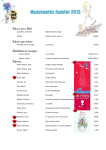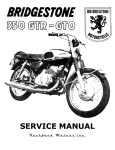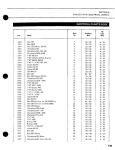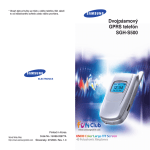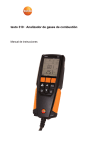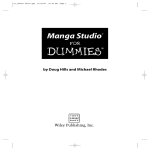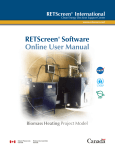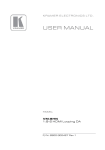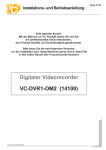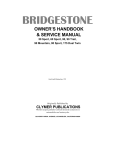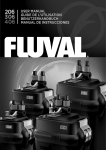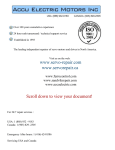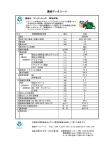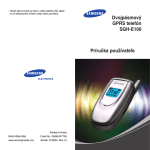Download Bridgestone Service Letters
Transcript
DRY CHARGED STORAGE BATTERIES . . . . . . . . . . . . . . . . . . . . . . . . . . . . . . . . . . . . . . . . . . . 3 SERVICE LETTER INDEX SYSTEM . . . . . . . . . . . . . . . . . . . . . . . . . . . . . . . . . . . . . . . . . . . . . . . 5 SPARK PLUG RECOMMENDATIONS . . . . . . . . . . . . . . . . . . . . . . . . . . . . . . . . . . . . . . . . . . . . . 6 ENGINE OVERHEATING . . . . . . . . . . . . . . . . . . . . . . . . . . . . . . . . . . . . . . . . . . . . . . . . . . . . . . . . 8 SPARK ARRESTER . . . . . . . . . . . . . . . . . . . . . . . . . . . . . . . . . . . . . . . . . . . . . . . . . . . . . . . . . . . . 10 SET-UP PROCEDURE & PRE-DELIVERY SERVICE – 175 DUAL TWIN . . . . . . . . . . . . . . . 11 BATTERY CHARGING – 50-60 SPORT . . . . . . . . . . . . . . . . . . . . . . . . . . . . . . . . . . . . . . . . . . . . 13 175 OIL INJECTION PUMP MODIFICATION . . . . . . . . . . . . . . . . . . . . . . . . . . . . . . . . . . . . . . 14 MAIN JET SIZES . . . . . . . . . . . . . . . . . . . . . . . . . . . . . . . . . . . . . . . . . . . . . . . . . . . . . . . . . . . . . . . 15 PISTONS AND RINGS . . . . . . . . . . . . . . . . . . . . . . . . . . . . . . . . . . . . . . . . . . . . . . . . . . . . . . . . . . 16 BS 90 OIL INJECTION PUMP . . . . . . . . . . . . . . . . . . . . . . . . . . . . . . . . . . . . . . . . . . . . . . . . . . . . 17 BS 175 HIGH SPEED OPERATION IN HOT WEATHER . . . . . . . . . . . . . . . . . . . . . . . . . . . . . 18 OIL INJECTION SYSTEM . . . . . . . . . . . . . . . . . . . . . . . . . . . . . . . . . . . . . . . . . . . . . . . . . . . . . . . 20 175 CHARGING SYSTEM . . . . . . . . . . . . . . . . . . . . . . . . . . . . . . . . . . . . . . . . . . . . . . . . . . . . . . . 21 LEFT AND RIGHT UP SWEPT MUFFLER PARTS . . . . . . . . . . . . . . . . . . . . . . . . . . . . . . . . . . 23 BS/175 POINTS AND CONDENSER . . . . . . . . . . . . . . . . . . . . . . . . . . . . . . . . . . . . . . . . . . . . . . 24 B/S 50 SPORT FRONT FORK . . . . . . . . . . . . . . . . . . . . . . . . . . . . . . . . . . . . . . . . . . . . . . . . . . . . 26 B/S 175 GEAR TIMING . . . . . . . . . . . . . . . . . . . . . . . . . . . . . . . . . . . . . . . . . . . . . . . . . . . . . . . . . 28 B/S CRANKSHAFT REPAIRS . . . . . . . . . . . . . . . . . . . . . . . . . . . . . . . . . . . . . . . . . . . . . . . . . . . . 29 175SR AIR CLEANER INSTALLATION . . . . . . . . . . . . . . . . . . . . . . . . . . . . . . . . . . . . . . . . . . . 31 BS350GTR OIL PUMP TIMING . . . . . . . . . . . . . . . . . . . . . . . . . . . . . . . . . . . . . . . . . . . . . . . . . . . 32 BS350 CLUTCH CHANGE . . . . . . . . . . . . . . . . . . . . . . . . . . . . . . . . . . . . . . . . . . . . . . . . . . . . . . . 33 BS350GTR CLUTCH . . . . . . . . . . . . . . . . . . . . . . . . . . . . . . . . . . . . . . . . . . . . . . . . . . . . . . . . . . . . 34 BS350GTR PERFORMANCE AND TUNING . . . . . . . . . . . . . . . . . . . . . . . . . . . . . . . . . . . . . . . 36 BS175 OIL PUMP REPAIR KIT . . . . . . . . . . . . . . . . . . . . . . . . . . . . . . . . . . . . . . . . . . . . . . . . . . . 37 REPAIR STUDS . . . . . . . . . . . . . . . . . . . . . . . . . . . . . . . . . . . . . . . . . . . . . . . . . . . . . . . . . . . . . . . . 38 SUGGESTIONS FOR FINE TUNING THE BRIDGESTONE 350 GTR . . . . . . . . . . . . . . . . . . . 39 MODIFICATION OF 2ND GEAR A AND 4TH GEAR B . . . . . . . . . . . . . . . . . . . . . . . . . . . . . . . . 41 100 TRAIL RECTIFIER . . . . . . . . . . . . . . . . . . . . . . . . . . . . . . . . . . . . . . . . . . . . . . . . . . . . . . . . . . 42 BRIDGESTONE 350 GTR ENGINE REPAIR . . . . . . . . . . . . . . . . . . . . . . . . . . . . . . . . . . . . . . . . 43 WIRING MODIFICATION FOR BRIDGESTONE 200 RS AND 200 SS . . . . . . . . . . . . . . . . . 44 STANDARD EQUIPMENT MIRRORS . . . . . . . . . . . . . . . . . . . . . . . . . . . . . . . . . . . . . . . . . . . . . 45 100 TMX HANDLEBAR . . . . . . . . . . . . . . . . . . . . . . . . . . . . . . . . . . . . . . . . . . . . . . . . . . . . . . . . . 46 SET-UP PROCEDURE AND PRE-DELIVERY SERVICE CHIBI by Rockford . . . . . . . . . . . . . . . . . . . . . . . . . . . . . . . . . . . . . . . . . . . . . . . . . . . . . . . 48 SET-UP PROCEDURE AND PRE-DELIVERY SERVICE C435 CHIBI DELUXE by Rockford . . . . . . . . . . . . . . . . . . . . . . . . . . . . . . . . . . . . . . . . . . 50 BRIDGESTONE by Rockford Service Letter # SUBJECT DRY CHARGED STORAGE BATTERIES BSG-0002 DATE MODEL 7/31/64 All The fully charged battery acts as a voltage stabilizer in the electrical system. Because the magneto delivers considerably more current than the rated voltage of the system, a fully charged battery is essential as a buffer between the current generating source and the various light bulbs on the cycle. A discharged battery does not provide sufficient electrical resistance to perform this "buffer" function and light bulbs will be burned out when they are switched on due to the excessive current reaching them from the magneto or generator through the discharged battery. For this reason, it is important that the dealer properly fill and charge the battery just prior to delivering the machine. PRE-DELIVERY BATTERY SERVICE PROCEDURE 1. 2. 3. 4. Fill battery to proper level with 1.260 specific gravity electrolyte. Allow battery to stand for 2-8 hours without charging. Inspect liquid level and add more electrolyte, if necessary. Measure specific gravity with a hydrometer. Table 1 indicates the approximate degree to which the battery is charged (stated as the percent charged) and the approximate ampere / hours of charge which will be necessary to bring the battery to a fully charged condition. TABLE 1 SP. GR. MEASURED PERCENT CHARGED APPROXIMATE CHARGE REQUIRED (IN AMPERE/HOURS) 1.260 100% 0* 1.220 75% 18 A/H 1.160 50% 30 A/H 1.105 25% 45 A/H *While it is theoretically possible, rarely, if ever, will a dry charged battery be found to be fully charged when the electrolyte is added. 5. To charge the filled battery, a 2-½ A/H charge rate may be used in the initial state of charging. The charge is then completed with a ½ Amp, trickle charge. (See Note 1). The approximate charging time for each of these two charge rates is indicated in Table 2. This table is based on the hydrometer reading taken in 4 above. IMPORTANT CHECK TEMPERATURE OF BATTERY CASE FREQUENTLY WHILE CHARGING. TEMPERATURE MUST NEVER EXCEED 115 (WARM TO THE TOUCH) IF CASE BECOMES HOT, REDUCE CHARGING RATE. OVERHEATING WILL CAUSE SEVERE BATTERY DAMAGE. (See Note 1). TABLE 2 SP. GR. @ 70E APPROXIMATE CHARGING TIME @ 2.5 AMP/HOUR APPROXIMATE CHARGING TIME @ ½ AMP/HOUR 1.240 2 Hour plus 10 Hour 1.220 4 Hour plus 20 Hour 1.160 8 Hour plus 20 Hour 1.105 10 Hour plus 30 Hour AGAIN NOTE THAT IF BATTERY CASE BECOMES HOTTER THAN 115E (WARM TO THE TOUCH) CHARGE RATE MUST BE REDUCED IMMEDIATELY! NOTE 1 As a matter of practice, the maximum charge rate depends largely on the air temperature of the area where the battery is being charged. A charge rate of up to 50% of the total charge required (see Table 1) can be used IF TEMPERATURE OF THE BATTERY CASE DOES NOT RISE ABOVE THE POINT AT WHICH IT IS JUST WARM TO THE TOUCH (115E F) . Therefore, the cooler the surrounding air temperature, the higher the allowable charge rate. As an example, assume the specific gravity of the electrolyte in the battery measures 1.220. Table 1 indicates a charge of 18 A/H will be required. Assuming that the air temperature is cool enough to hold battery case temperature below 115E F., a charge rate of 9 A/H can be used (50% of 18 A/H). CHARGING CAUTIONS 1. DO NOT OVERCHARGE. Take specific gravity readings frequently during charging period. 2. CONNECT CHARGER CORRECTLY. Positive lead to positive terminal, negative lead to negative terminal. 3. Set charger for correct voltage (6V or 12V). 4. DO NOT LET FILLED, UNCHARGED BATTERY STAND LONGER THAN 12 HOURS BEFORE CHARGING. ROCKFORD MOTORS, INC. SERVICE DEPARTMENT BRIDGESTONE by Rockford Service Letter # SUBJECT SERVICE LETTER INDEX SYSTEM BSG-00?? DATE MODEL 7/31/64 All Effective immediately, a new indexing and numbering system has been added covering Rockford Service Letters. Where the Service Letter applies to one model only, the index number prefix will be the factory model designation of the merchandise to which the letter applies. (The factory model designation appears on the serial number plate of the vehicle). Thus, the indexing system operates as follows: 1. Service letters numbered with the prefix "BSHM" - pertain to model BS-HM/S, Bridgestone "50" (Rockford Model C204). 2. Service letters numbered with the prefix "BS7-" pertain to models BS-7S and BS-7D, Bridgestone 7 Standard and Bridgestone 7 Deluxe (Rockford Models C206 and C207). 3. Service letters numbered with the prefix "BS90-" pertain to models, BS-90 and BS-90T, Bridgestone 90 and Bridgestone 90 Trail-Scrambler (Rockford Models C208 and C209). 4. Service letters numbered with the prefix "BSG-" pertain to more than one model or cover a general subject. The Service Letters should be filed by prefix and number for ready reference. All pertinent previously issued service letters will be re-issued to conform to the new system. ROCKFORD MOTORS, INC. SERVICE DEPARTMENT BRIDGESTONE by Rockford SUBJECT Service Letter # SPARK PLUG RECOMMENDATIONS BSG-0015 revised DATE MODEL 8/1/6? All Listed below are the NGK and Champion spark plugs recommended for use in Bridgestone motorcycles, depending upon the type of service in which the cycles are used. Note particularly that the plugs listed in the last column are suitable only in those instances where the cycle is used for extended periods of time at close to its maximum speed, such as in road racing or extended touring. MODEL BS-HMS BS-7S & D BS-50 SP BS-60 SP BS-90 STD BS-90 T BS-90 M BS-90 SP BS-90 R BS-100 SP BS-100 R BS-100 T BS-100 GP BS-100 TMX BS-175 DT & HS BS-175R BS-200 RS & SS BS-350 GTR PLUG BRAND NGK CHAMPION NGK CHAMPION NGK CHAMPION NGK CHAMPION NGK CHAMPION NGK CHAMPION NGK CHAMPION NGK CHAMPION NGK CHAMPION NGK CHAMPION NGK CHAMPION NGK CHAMPION NGK CHAMPION NGK CHAMPION NGK CHAMPION NGK CHAMPION NGK CHAMPION NGK CHAMPION STANDARD NOTE 1 B-6 I-8 B-6 I-8 B-7 I-4 B-8 I-4 B-7H L-5 B-7H L-5 B-7HZ L-5 B-7H L-5 B-8HN L-57R B-8H L-57R B-8HN L-57R B-8H L-57R B-8H L-57R B-8H L-57R B-8H L-57R B-8HN L-57R B-8H L-57R B-8H L-57R LOW SPEED NOTE 2 B-4 I-12 B-4 I-12 B-6 I-8 B-7 I-8 B-6H L-7 B-6H L-7 B-6H L-7 B-6H L-7 B-8H L-57R B-7H L-5 B-8H L-57R B-7H L-5 B-7H L-5 B-7H L-5 B-7H L-5 B-8H L-57R B-7H L-5 B-7H L-5 HIGH SPEED NOTE 3 B-7 I-4 B-7 I-4 B-8 I-62R B-8 I-62H B-7HC L-60R B-7HC L-60R B-7HC L-60R B-7HC L-60R B-9H L-54R B-9H L-54R B-9H L-54R B-9H L-54R B-9H L-54R B-9H L-54R B-9H L-54R B-9H L-54R B-9H L-54R B-9H L-54R COMPETITION NOTE 4 B-7C I-60R B-7C I-60R B-8C I-60R B-8C I-60R B-8H L-57R B-8H L-57R B-8H L-57R B-8H L-57R B-9HN – B-8HN L-57R B-9HN – B-8HN L-57R B-8HN L-57R B-8HN L-57R B-8HN L-57R B-9HN – B-8HN L-57R B-8HN L-57R RACING NOTE 5 B-8 I-62R B-8 I-62R B-8N I-57R B-8N I-57R B-9H L-54R B-9H L-54R B-9H L-54R B-9H L-54R – – B-9HN L-54R – – B-9HN L-54R B-9HN L-54R B-9HN L-54R B-9HN L-54R – – B-9HN L-54R B-9HN L-54R NOTE 1: Standard plugs for normal use. NOTE 2: Low speed plugs where fouling is a problem. NOTE 3: High speed plugs where electrode burning is a problem. NOTE 4: Competition plugs (short track or scrambles.) NOTE 5: Racing plugs for continuous high speed use. Racing plugs are extremely cold plugs and operate well only at very high cylinder head temperatures. Starting and warm up may be difficult. COMPARISON CHART NGK CHAMPION AC AUTO LITE BOSCH KLG LODGE B-4 J-11 46 A9 W123T3 TFS30 CAN 14 B-6 B-7 45 44 43 C42 41 A7 A5 A3 A703 A603 W145T3 W175T3 W190 W225T3 W240T1 TFS50 FS70 FS75 C14 HAN14 2HAN14 HHN B-8 J-8J J6J J4J J2J J-60R J-59R J-57R B8N T-54R 14 M/M d REACH HOT B7C B77C COLD FS100 A403 A203 14 M/M ½ REACH HOT COLD B6H L-7 47FF AE4 W175T1 F75 HF-2H B7H B7HC B7HZ B77HC B8H B8HN B9H L-5 L-5J 45FF AE2 W225T1 F100 HNP L-60R L-57R 44FF 42FF AE603 W310T16 F250 R47 AE403 W370T16 F280 R49 AE203 W400T16 F310 R51 BIOH L-57R L-54R ROCKFORD MOTORS, INC. ROCKFORD, ILLINOIS BRIDGESTONE by Rockford SUBJECT Service Letter # ENGINE OVERHEATING BSG-0018 DATE 6/15/65 MODEL All The major causes of engine overheating are the following: 1. Improper break-in procedure. 2. Improper fuel oil mixture. 3. Incorrect ignition timing (see Service Letter BSG-0019) 4. Incorrect spark plug in use (see Service Letter BSG-0015) 5. Spark plug incorrectly gapped 6. Faulty points & condenser 7. Dirt in carburetor 8. Carbon accumulation in cylinder ports 9. Excessively heavy oil in transmission case. 10. Tires underinflated; brake drag; chain too tight 1. Improper Break-In. One of the most frequent causes of engine damage due to overheating is improper break-in. There appears to be some confusion in the field about the necessity of break-in because some 2-cycle engines such as chain saws and outboards do not require it. IT IS IMPORTANT TO NOTE THAT ALL MOTORCYCLES, REGARDLESS OF BRAND, REQUIRE ENGINE BREAK-IN. Chain saws are not run continuously at high R.P.M nor are they required to accelerate under load, thus avoiding overheating. Outboards are water cooled and excessive heat is easily controlled. All motorcycle manufacturers specify break-in periods ranging from 250 to 2500 miles, depending upon the type of engine used. Friction is greater during break-in until rings have had an opportunity to seat and the cylinder wall has acquired a glaze. Bridgestone cycles should be run-in for a minimum of 250 miles. Sustained high speeds should be avoided for at least 500 miles, preferably 1000 miles, YOU MUST IMPRESS THESE FACTS UPON PURCHASERS: 1. 2. 3. 4. 5. Observe maximum break-in speeds Avoid fast engine warm up. Avoid fast starts Avoid fast shifting through the gears Avoid overloading Once a Bridgestone cycle is broken in properly, it is the most trouble-free machine available as attested to by the number of large rental operators who are discontinuing other makes in favor of Bridgestone. 2. Fuel & Oil Mixture. It is important to use the proper oils and correct mixing ratios. Always use a good grade of regular gas mixed with a brand name 2-cycle oil that is recommended for air cooled engines. Never use special additive oils, or high ratio oils (50:1 or 100:1) Always use 15:1 ratio for break-in and 20:1 thereafter. 3. Incorrect ignition timing. The next most frequent cause of overheating is excessively advanced ignition timing. Service Letter BSG-0019 covers the timing procedure and should be carefully noted by all service personnel because of its importance. 4. Incorrect Spark Plug in Use. (See Service Letter BSG-0015.) A spark plug not recommended for use under the particular operating conditions can result in overheating. Select the correct plug based on the information given in Service Letter BSG-0015. 5. Spark Plug Incorrectly Gapped. An incorrectly gapped plug can effect Ignition timing. The problem is most frequently found when an American- made plug is installed. The standard equipment NGK plugs are factory gapped within the correct .025 – .028 range. American plugs will almost always be factory set at a wider gap. Gap should be set before installation. 6. Faulty Points and Condenser. Check point surfaces for wear. Check condensers against specifications as set forth in Service Letter BSG-0008. 7. Dirt In Carburetor. This condition, obstructs fuel flow and results in running too lean a mixture which causes overheating. 8. Carbon Accumulation in Cylinder Ports. A carbon accumulation in transfer and exhaust ports can restrict the flow of fuel mixture and exhaust gasses. This will result in the generation of excessive heat. 9. Transmission Oil Too Heavy. Excessively heavy oil in the transmission case causes the engine to overwork due to extra drag. The transmission should be filled with the correct amount of S.A.E. 10W-30 motor oil. 10. Tires, Brakes, Chain. These items must be periodically checked to avoid placing an abnormal load on the engine due to drag. SERVICE DEPARTMENT BRIDGESTONE by Rockford SUBJECT Service Letter # SPARK ARRESTER BSG-0021 DATE MODEL 7/1/65 All The mufflers supplied on Bridgestone cycles are not designed or approved to be used as spark arresters. In areas where spark arresters are required by the U.S. Forestry Service, we suggest the use of an Erickson Products Co. "Gill type" spark arrester. Part No. 3CIP. These spark arresters are available from: Erickson Products Co. 1960 Carroll Avenue San Francisco, California They are also available from some dealers in heavy "use" areas. This spark arrester can be easily attached to the end of the muffler for approved use by the U.S.F.S. ROCKFORD, ILLINOIS BRIDGESTONE by Rockford Service Letter # SUBJECT SET-UP PROCEDURE & PREDELIVERY SERVICE – 175 DUAL TWIN BSG-0024 DATE 9/5/65 MODEL All I. SET UP The attached sheet details the set-up procedure for the BRIDGESTONE 175 DUAL-TWIN. II. PRE-DELIVERY SERVICE A. OIL INJECTION. The Oil Injection system is factory adjusted for proper operation. Fill the oil supply tank with 2-cycle oil. Be certain to instruct the purchaser to regularly check the oil supply through the glass inspection port. IT MUST NEVER BE ALLOWED TO RUN DRY! B. FUEL. Fill the fuel tank with a 20:1 mixture of regular gas and 2 cycle oil (1 quart of oil in 5 gallons of gasoline). This mixture is to be used during the 1st 250 miles of operation only. Thereafter, instruct the customer to fill the tank with "regular" gasoline only. C. BATTERY – Fill and charge the battery following the procedure in Service Letter BSG-0002. D. TRANSMISSION – Fill the transmission case with 25 ounces of SAE motor oil. Transmission oil level is checked by removing the oil level plug located just in front of the kick starter shaft. Do not overfill the transmission case. E. OIL PUMP GEAR BOX – The Oil Injection pump is gear driven by the crankshaft and gear cavity oil level must be checked before operation. The gear cavity is located behind the oil pump and left carburetor (Figure 1 ). This cavity must be kept filled with a good grade of 30 weight motor oil. To fill, proceed as follows: A. Remove left carburetor cover. B. Remove oil level screw (indicated by arrow in figure 1.) This oil level screw is easily identified because it has a red fiber gasket under it. (Note: The carburetor has been removed in figure 1 for clarity.) C. Lean the cycle to the right and fill the gear cavity through the oil level hole, using a pressure-type oil can. Note: Because of air trapped in the gear cavity, it may be difficult to determine the exact level. For an accurate measurement of the oil level, put cycle upright and kick the starter several times. Oil will level itself and trapped air will be forced out. Oil level should reach lower edge of oil level plug screw hole. Oil level should be checked every 500 miles. Figure 1 F. ADJUSTMENTS A. Tire Pressure – 24 to 26 lb. – Front 26 to 30 lb. – Rear B. Brakes – check and adjust as described in owner's manual. C. Horn – check for proper operation. D. Lights – check all lights for proper operation. E. Axle Nuts – be certain both front and rear axles are properly secured. Cotter pin must be installed in castle nut on front axle. F. Chain – check and adjust as required. (See owner's manual) G. Steering Damper – check for proper operation. The damper is intended for use at high speed only. Do not over-tighten. H. Idle – adjust idle, if necessary, by visually checking the position of the carburetor throttle valves. (See owners manual) Adjust cable adjusters on top of carburetors so that, with throttle grip closed, 1/32" of free play can be felt in the throttle cable at each carburetor. I. Oil Injection Adjustment – the entire oil injection system is designed to provide the correct oil mixture at all speeds. The only adjustment it will ever need is the cable adjustment. The oil pump volume is affected by the position of the throttle and varies from 20 to 1 mixture at full throttle to 100 to 1 at idle. To adjust the oil pump control cable proceed as follows: a. Remove left carburetor cover. b. Turn throttle grip to maximum open position. c. Check the oil pump control arm (where the cable is connected) and note the pin in the oil pump body and 2 stops on the control arm. (Fig. 2). At the maximum open throttle position the stop should be within l/8 inch or the stop pin. If the stop clearance is open more than 1/8 inch or the stop is closed against the pin, adjustment is necessary. d. Cable adjustment is made at the cable adjusting screw located above the left carburetor housing, directly in front of the generator. Loosen cable adjusting screw lock nut and turn adjusting screw in for additional stop clearance and out for less until 1/8 inch of stop clearance is observed with the throttle at maximum open position. NOTE: A. Do not adjust to less than l/8 inch clearance. B. When throttle is closed after adjustment, the oil pump control arm may not return to its closed position and may appear to be faulty. However, the oil pressure in the pump sometimes holds the control arm open when it is operated without the engine running. This can be checked by running the engine or operating the kick starter. III. BREAK-IN FIRST 250 MILES – Fill oil injection supply tank with 2 cycle oil and fill fuel tank with a 20:1 gas-oil mixture. Do Not Exceed 40 MPH for first 250 miles. Do not run Figure 2 at any one speed for long periods. Vary the speed constantly. 250 TO 500 MILES – Fill fuel tank with regular gas only. Be certain oil injection supply tank is full. Do Not Exceed 50 MPH. Vary speed constantly during this period. 500 TO 750 MILES – Do Not Run Continuous Maximum Speed. CHECK OIL INJECTION TANK LEVEL DAILY. Engine will be severely damaged if tank is allowed to run dry. NOTES: 1. A 20:1 gas/oil mixture is used in addition to oil injection during first 250 miles to insure proper break-in of engine and oil pump. 2. Never run engine at a constant speed during break-in. Run it up to the maximum allowable speed for a minute or two and then back down to a lower speed. Repeat this procedure constantly. 3. Clean spark plugs every 100 miles during break-in. 4. Change transmission oil after first 250 miles and after 750 miles. Then change at regular recommended intervals. 5. Check and recharge battery if necessary after first 250 & 500 miles. At slow speeds battery does not charge at normal use rates. 6. Check frequently for normal chain stretch and adjust as required. BRIDGESTONE by Rockford Service Letter # SUBJECT BATTERY CHARGING – 50-60 SPORT BSG-0024 DATE Jan. 1,1966 MODEL 50-60 SPORT Listed below are two methods of increasing the charge rate on the B/S 50-60 Sport. 1. Connect both the yellow wire and the white wire from the key switch to the yellow wire from the charging coil in the magneto. The white wire from the magneto is left disconnected. This wiring change will slightly increase the charging rate. 2. For chronic problems caused from the cycle being driven only at very low speeds, the charging coil from the B/S 7 Standard can be installed (part no. E19221) to increase charging. This coil must be connected as shown in the 50-60 Sport wiring diagram. NOTE: When either method is used, battery water should be checked frequently and water added as necessary. ROCKFORD MOTORS, INC. ROCKFORD, ILLINOIS BRIDGESTONE by Rockford Service Letter # SUBJECT 175 OIL INJECTION PUMP MODIFICATION BSG-0029 revised DATE Jan. 1,1966 MODEL B/S 175 Bridgestone 175 Dual Twins manufactured after Serial No. 16V, are equipped with a modified oil injection pump, The new pump is equipped with ball and spring check valves in each of the pump body oil outlets. The springs fit Inside the union bolts which are unchanged from previous models. POINTS TO REMEMBER WHEN DISMANTLING OIL PUMP: 1. Ball check, valves are installed only in the outlet ports. (Never in the inlet port.) 2. Ball check valves cannot be installed in the old style pumps that were not originally equipped with them. 3. When assembling the unit, first install the ball in the outlet port hole. Next, install the spring into the union bolt. Then with the oil line connector and packing washers installed on the bolt, screw the bolt into the outlet port hole . 4. The style of oil pump can be determined by viewing into the outlet port holes. The outlets on the old style pumps have no ball valve seats machined in them and the check ball will pass through the outlet, into the oil pump body. The new style pumps have check ball valve seats machined in the outlet ports. 5. New style oil pump assemblies are interchangeable with the old style assembly. An additional change was made in Serial No. 16B. This change incorporates the ball and spring check valves into a new style outlet connector. Part Number 1502-8000 check valve connector. The ball and spring are assembled inside of the new connector and eliminate the possibility of incorrect assembly or loss of these parts. The new connectors are easily identified because they are made of brass instead of aluminum. These new connectors are Interchangeable on any of the old type pumps. When they are installed on old type pumps, the ball and spring must be eliminated from the connecting bolts. Any old type pump can be converted to the latest style by installing 2 of these new outlet connectors. The old type union connector P/N 1565-8000 has been abolished. ROCKFORD MOTORS , INC . ROCKFORD, ILLINOIS BRIDGESTONE by Rockford Service Letter # SUBJECT MAIN JET SIZES BSG-0033 revised DATE MODEL 2-1-68 ALL Listed below are the carburetor main jet sizes that are used as standard equipment on Bridgestone cycles. Also listed are other sizes that are available. PART NO. SIZE FOR 9MM CARBURETOR 1635-3000 - 70 1635-3000 - 80 FOR 15 MM CARBURETOR 1635-5000 - 95 - 100 - 110 - 120 - 130 - 140 - 150 STANDARD BS-HMS BS-7 C204 C206-207 BS-90 Before 12N BS-50-60 Sport C300-301 BS-90T BS-90 After 12N C209 C208-210 FOR 17MM CARBURETOR AND OVER 1635-5010 - 75 - 80 - 85 - 90 - 95 BS-90 Sp Before 14L - 100 BS-90 Sp After 14L & BS 175DT & HS - 110 BS-100 Sp - 100T C314-C319 - 120 - 130 BS-350 GTR/GTO - 140 BS-350 GTR C320 - 150 - 160 - 170 - 180 - 190 - 200 - 210 - 220 - 230 - 240 - 250 - 260 - 270 - 280 - 290 - 300 BRIDGESTONE by Rockford SUBJECT Service Letter # PISTONS AND RINGS BSG-0036 DATE 3-1-68 MODEL BS90 & 175 Listed below are the piston and ring sets used on the Bridgestone 90 and 175 DT. MODEL PISTON PART NO. RING SET PART NO. BS-90STD -90T - 90M 1341-5000 1305-5000 BS-90 SPORT 1341-5010 1305-5010 BS-175 DT 1341-5010 1305-5010 NOTE : 1. Pistons for the 90 STD - 90T - 90M could be used for replacement in the 90 Sport or 175 but only in cases of emergency (they are of a harder material and will wear the chrome faster.) 2. Pistons for the BS 90 Sport and BS 175 are not interchangeable and cannot be used in the cast iron cylinders of the BS 90 STD - 90T - 90M. (They are of a softer material and will wear rapidly against cast iron.) 3. The chrome plated ring used in the BS 90STD - 90T - 90M cannot be used for the BS 90 Sport or 175. Chrome will not operate properly against chrome. 4. Pistons made only for cast iron cylinders can be recognized by the small center drilled hole in the top of the piston. 5. Pistons made only for chrome plated aluminum cylinders can be recognized by the small flat spot on the top of the piston. 6. On models produced before Jan. 1, 1967, the 90 Sport and 175 pistons can be distinguished by the "T" stamped on the top of 175 pistons and no mark on 90 Sport pistons. On models produced after Jan. 1, 1967, pistons are the same. (No mark) 7. For maximum service it is suggested that the correct part number and parts always be used for replacement. 8. When installing new pistons or cylinders, the piston clearance should be checked and adjusted for proper operation. Check the piston clearance at the skirt of the piston and just above the ports in the cylinder. Correct piston clearance for cast iron cylinders .0025 - .004" Correct piston clearance for aluminum cylinders .0015 - .0025" NOTE: On cast iron cylinders, the cylinder can be honed to adjust clearance, on aluminum cylinders, the piston must be polished to adjust clearance. ROCKFORD MOTORS, INC. ROCKFORD, ILLINOIS BRIDGESTONE by Rockford Service Letter # DATE MODEL SUBJECT BS 90 OIL INJECTION PUMP BSG-0038 4-15-66 ALL BS90 With Oil Injection Shown below is the BS 90 with oil injection pump and various parts that are assembled to it. If for any reason some parts are removed or disassembled, it is important that the reassembly be exactly as shown, or serious engine damage could result. NOTE: 1. When assembling the intake port fitting, the spring must be installed first into the pump and then the check: ball. Only a brass connector bolt can be used in this port. 2. When assembling the outlet port fitting the check ball is installed first into the pump and then the spring. Only a brass connector bolt can be used in this port. 3. When assembling the oil line onto the rotary valve cover, the steel connector bolt must be used. 4. Care must be used not to overtighten any of the connect bolts. 5. If the oil pump assembly is removed from the engine it will be necessary to fill the oil pump gear box with oil before operating. BRIDGESTONE by Rockford Service Letter # SUBJECT BS 175 HIGH SPEED OPERATION IN HOT WEATHER BSG-0039 DATE 4-15-66 MODEL BS-175 Whenever an engine is operated at any constant speed (particularly at or near maximum speed) for continuous periods of time the engine's operating temperature slowly rises. This rising temperature eventually will stabilize at a constant temperature. Because of the varying termperature of the outside air, the combustion point of fuels and oils, and the condition of the engine, in extreme cases where the outside air temperature is 60 degrees or more and the throttle is held open for exceptionally long periods, the engine temperature could rise to a point where some loss of performance may result. Listed below are suggestions and adjustments that should be made for hot weather and continuous high speed driving. 1. SPARK PLUG The spark plug furnished is standard equipment NGK B8H. For break-in it is recommended that the NGK B7H or B77 HC spark plug be used to help prevent oil fouling. CAUTION: Never operate the cycle at more than 40 MPH with this hotter plug. For most ordinary driving where continuous high speeds are not encountered use the NGK B8H spark plug. For continuous driving at or near maximum speed where outside air temperature is 60 degrees or more use a colder spark plug such as NGK B9H or B10H. 2. FUEL Always use a good grade of regular gas. Never use an ethyl or highly leaded gas. 3. OIL Always use a good 2 cycle oil that is recommended for air cooled engines such as Rockford oil. Never use oils of higher viscosity then SAE 40,high ratio mix oil, or special additive oils. 4. IGNITION TIMING The ignition timing should never be adjusted to any setting other than the specified setting according to the timing marks on the crankshaft. (See Service Letter BSG-0025) 5. OIL PUMP ADJUSTMENT The oil pump cable adjustment should always be maintained according to the in- structions in the Service Letter BSG-0024. The adjustment should be checked after break-in and adjustment made if any cable stretch as changed the setting. If the control arm has more than 1/8 inch clearance between the stop pin at full throttle, the engine may not be receiving the proper amount of oil. By properly servicing and adjusting the cycle, a much lower engine temperature can be sustained even in hot weather. This cooler running temperature will help extend spark plug life, increase performance, and lower the fuel consumption insuring the customer of maximum service from his Bridge- stone motorcycle. ROCKFORD MOTORS , INC . ROCKFORD, ILLINOIS BRIDGESTONE by Rockford Service Letter # DATE MODEL SUBJECT OIL INJECTION SYSTEM BSG-0041 6-1-66 BS-175 DT Dealer reports have indicated that a simple check of the oil injection system can prevent serious damage when the machine is operated. Isolated reports Indicate that in some instances, the oil from the oil tank cannot reach the oil pump because of dirty or plugged oil lines, tanks, or filter. Whenever a new cycle is serviced the oil supply line to the pump should be removed at the pump and checked for oil flow. If a good supply of oil is not available at this line, check the tank, filter and lines and correct as necessary. Oil must flow freely from this line to supply the engine with the proper lubrication. ROCKFORD MOTORS, INC. ROCKFORD, ILLINOIS BRIDGESTONE by Rockford SUBJECT Service Letter # 175 CHARGING SYSTEM BSG-0042 DATE 6-1-66 MODEL BS-175DT Listed below is the proper testing procedure to be used to check the generator and charging system on the B/S 175 DT. Testing must be performed in sequence as listed to locate the problem exactly and quickly. Whenever testing and checking is to be performed, proceed as follows: 1. With the engine off, connect an amp meter into the circuit of the red wire on the battery at the fuse. 2. Start the engine in the daytime position of the key switch and observe the amp meter. At idle, the meter should show a discharge of 2 amps. When the engine is run faster (4000 RPM) the meter should read "0". (No charge or discharge) with models equipped with the high-low charge switch and the switch is in high charge position, the "0" (no charge or discharge) will occur at 3000 RPM. When the engine is run from 1/2 to full throttle, the amp meter should read 3 to 5 amps of charges. If all the above tests are correct, the battery will stay charged when the cycle is operated for normal use. 3. If in the above test the 2 amp discharge was observed but no charging occured, suspect a faulty key switch and proceed as follows: 4. Leave the red wire from the battery to the key switch disconnected and reconnect the amp meter, one lead to positive of the battery and the other lead to the red post of the rectifier. 5. Restart the engine and test as in #2. If readings observed in this position are correct, the key switch is faulty and replacement is indicated. If only discharge is observed, or (very low charge), 2 amp charge or less with high-low charge switch on or 1 amp rectifier and proceed as follows: 6. Remove all wires from rectifier and connect a D.C. test light, (battery operated) one lead to the black post and then touch the other lead to the yellow, blue, and white post one at a time. Now connect the test light in the same manner but reversing the leads, to the black post and use the opposite lead to touch the same color terminals. In the above test, the test light should have burned at all three connections in one test, and the test light should not have burned in the other. (D.C . current will pass through a selenium rectifier in only one direction). If the test light did not burn according to the above, the rectifier can be considered faulty. If this test was normal, check the other half of the rectifier by using the red post and touching the yellow, blue, and white and proceed as above. If no positive conclusion can be made from this test, substitute another rectifier and test as in #2. 7. If the charge reading is still below the 3-5 amp with the high-low charge switch in the on position and operating the high-low charge switch from on to off does not change the charge rate (at half to full throttle), suspect a faulty switch and connect the brown wire from the generator to the white post of the rectifier, if charging is then correct, replace the charge switch. 8. Generator Test. The generator can be checked with a test light. A battery operated test light should burn when connected to any two of the yellow, blue or brown wires. The test light should not Light from any wire, (yellow, blue or brown) when the other test lead wire is grounded to the generator frame. 9. If all components seem to test satisfactory and charging is still below standard, the generator magnets may be weak and replacement would be necessary. 10. When checking the charging system always check the terminals on the wires ends to make sure they have good contact. 11. For the proper readings, always use a charged battery when testing. 12. If the charge rate is found satisfactory and battery becomes discharged, the battery may be defective and will not hold a charge. Check the battery after fully charging it and if the specific gravity of the fluid is not above 1.240, the battery is probably defective. If the gravity is above 1.240 but will drop to below this reading in 24 hours without connecting it in the cycle, the battery is defective. 13. If both the battery and the charge rate are satisfactory, suspect that the customer is running at too slow an average speed and suggest that he operate the cycle in a lower gear to keep the engine turning faster (especially for very slow speed city driving). 14. In some cases it has been found that a customer may ride with his foot on the brake pedal so that the stop light burns continuously. It is recommended that the cycle not be allowed to idle more than the normal amount necessary in operating the cycle. These practices help run the battery down and the customer should be instructed against them. BRIDGESTONE by Rockford Service Letter # SUBJECT LEFT AND RIGHT UP SWEPT MUFFLER PARTS BSG-0043 DATE 7-1-66 MODEL B/S 90M B/S 60 Sport Listed below are the parts used for left and right muffler assemblies for B/S 90 Mountain and B/S 60 Sport. Use this list whenever ordering parts. UP SWEPT MUFFLER FOR BS 90 MOUNTAIN RIGHT SIDE MOUNTED PART NAME LEFT SIDE MOUNTED EA1-63310 Muffler Assembly 6301-5040 EA1-63313 Inner Pipe 6320-5020 EA13-63331 Muffler Stay 6335-5020 EA13-63327 Front Protector 6332-3210 6333-5010 (EA13-63328) Rear Protector 6333-5010 EA13-63329 Protector Bracket (Not used) EA13-63111 Exhaust Pipe 6351-5050 6362-5000 (EA1-63121) Rubber Joint 6362-5000 UP SWEPT MUFFLER FOR BS 60 Sport RIGHT SIDE MOUNTED PART NAME LEFT SIDE MOUNTED EA13-63300 Muffler Assembly 6310-3220 EA1-63313 Inner Pipe 6320-5020 EA13-63331 Muffler Stay 6335-3210 EA13-63327 Front Protector 6332-3210 6333-5010 (EA13-63328) Rear Protector 6333-5010 EA13-63329 Protector Bracket (Not used) GB21-63111 Exhaust Pipe 6351-3220 6362-5000 (EA1-63121) Rubber Joint 6362-5000 ROCKFORD MOTORS, INC. ROCKFORD, ILLINOIS BRIDGESTONE by Rockford SUBJECT Service Letter # BS/175 POINTS AND CONDENSER BSG-0046 REVISED DATE 6-1-67 MODEL BS/175 Various changes to the points, condenser and generator have been made since the beginning of production of the BS 175. Below are shown the 3 types of generators. Always check the type of generator involved to be sure the correct parts are being used. The generator can be identified by matching the point type and location to one of the illustrations below. Listed with each type of generator are the parts to be used for that generator. Shown below is an illustration of the generator with the cap removed to expose the points and condenser. This type of generator was used on all B/S 175 DT before Serial No. 16G-11760. Replacement parts for the above generator are listed below: PART NO. DESCRIPTION 1703-8000 A.C. Dynamo 1736-8000 Breaker Cam (Double Lobe) 1752-8000 Left Contact Breaker Assembly 1753-8000 Condenser (Double Unit) 1757-8000 Right Contact Breaker Assembly 1741-8000 Timing Gear NO REQ'D 1 1 1 1 1 1 RELATED PARTS 2101-8000 2114-8000 6811-8000-FAR 8603-8000 Crankcase Assembly Upper Crankcase Plug Left Side Cover Charge Control Switch All other parts are shown in the 175 Parts List. 1 1 1 1 Shown below is an illustration of the generator with the cap removed to expose the points and condenser. This type of generator was used on all B/S 175 DT after Serial No. 16G-11761 up to Serial No. 16L-20757. This generator is also used on all B/S 175 HS beginning production up to Serial No. 16L-20757. Replacement parts for the above generator are listed below: PART NO. 1703-8001 1736-8010 1752-8000 1756-8010 1758-8010 DESCRIPTION A.C. Dynamo After 16G Breaker Cam, Single Lobe L & R Contact Breaker Left Condenser Right Condenser NO REQ'D 1 1 2 1 1 1741-8010 1742-8010 09075-103 09002-101 09046-104 2101-8010 6811-8010-FAR RELATED PARTS Timing Gear Idle Gear Ball Bearing 12 Snap Ring 12 Wave Washer Crankcase Assy Left Cover Red 1 2 1 1 1 1 All other parts are common with previous production and are shown in 175 Parts List. Shown below is an illustration of the generator with the cap removed to expose the points and condenser. This type of generator is used on all B/S 175 DT and B/S 175 HS after Serial No. 16L-20758. Replacement parts are listed below: PART NO. 1703-8002 1736-8001 1739-8001 1751-8001 1752-8001 1753-8000 1757-8001 DESCRIPTION A.C. Dynamo After 16L Breaker Cam, Single Lobe Breaker Cover Breaker Base Left Contact Breaker Condenser (Double Unit) Right Contact Breaker NO REQ'D 1 1 1 1 1 1 1 All other parts are common with previous production and are shown in 175 Parts List. ROCKFORD MOTORS, INC. ROCKFORD, ILLINOIS BRIDGESTONE by Rockford SUBJECT Service Letter # B/S 50 SPORT FRONT FORK BSG-0048 DATE 9-1-66 MODEL B/S 50 Sport Listed below are the front fork assemblies and parts for B/S 50 Sport. When ordering parts, be sure to check serial numbers and order accordingly. Example: All B/S 50 Sport serial numbers start with 13. This is the model code. The 3rd digit of the serial number is always an alphabetic letter. This letter indicates the month of manufacture. When parts are described as before or after 13N it indicates that serial numbers before 13N, (13K, 13L, 13M) use the older style part and serial numbers after 13N, (including 13N, 13O, 13P, 13Q, etc.) use the newer style part. FRONT FORK FOR B/S 50 SPORT UP TO SERIAL NO. 13U022397 INDEX NO. PART NO. DESCRIPTION NO REQ'D 14-0 14-1 GB1-41000-0-B GB1-41100 GB1-41100-1 GB1-41120 GB1-41220 GB1-41171 GB1-41172 K6N3-8 GB1-41173 GB1-41173-1 GB1-41182 GB1-41183 HW-8 EA1-41251 SW-8 GB1-41310 GB1-41321 SW-8 GB1-41410-0-B GB1-41420-0-B GB1-41511 GB1-41521 EA1-41541 KHW-8 Front fork assy, black Outer tube comp. before 13N Outer tube comp. after 13N Inner tube comp. L. Inner tube comp. R. Spring Spring guide 8 mm small hex. nut Outer tube nut before 13N Outer tube nut after 13N Bolt (upper bracket) 8 mm wave washer 8 mm flat washer Axle bracket bolt 8 mm spring washer Lower bracket complete Lower bracket bolt 8 mm spring washer Fork cover comp. L. Fork cover comp. R. Upper bracket Handle holder Bolt (handle holder) 8 mm small flat washer 1 2 14-2 14-3 14-4 14-5 14-6 14-7 14-8 14-9 14-10 14-11 14-12 14-13 14-14 14-15 14-16 14-17 14-18 14-19 14-20 14-21 1 1 2 2 2 2 2 2 2 2 1 1 1 2 2 1 1 1 2 4 4 RELATED PARTS BEFORE 13U022397 AFTER 13U022398 PART NO. DESCRIPTION PART NO. DESCRIPTION GB11-42117 GB11-42118 GB1-71130-1 Fender Stay B Fender Stay C Front Brake Panel 4424-3211 4423-3211 7131-3202 Fender Stay B Fender Stay C Front Brake Panel FRONT FORK FOR B/S 50 SPORT AFTER SERIAL NO. 13U022398 FIG NO. PART NO. DESCRIPTION NO. REQ'D 1 2 3 4 5 6 7 8 9 10 10 11 12 13 14 15 16 17 18 19 20 20 21 22 23 0142-0845 0421-0816 4162-3201 4166-3201 4127-3200 4124-3201 0411-1022 4161-3201 4123-3200 4181-3201-CUR 4181-3201-CBK 4113-3201 4151-3201 0111-0832 09490-116 4114-3200 4116-3200 09566-109 4131-3201 4111-3202 4171-3201-CUR 4171-3201-CBK 4122-3201 4121-3201 0141-0822 4133-3201 4100-3201-CUR 4100-3201-CBK Hex. bolt D (8x45 Hex. bolt) Plane washer B Handle holder Lower handle holder Dust Seal Upper bridge bolt Plane washer A Upper bridge Inner tube packing Right fork cover, red Right fork cover, black Inner tube A. (Left) Lower bridge Hex. bolt A 26 Oil Seal Outer tube nut Cushion slide metal 32 O ring Outer tube B. (Right) Outer tube A. (Left) Left fork cover, red Left fork cover, black Main spring guide Front cushion main spring Hex. bolt D (8x22 Hex. bolt) Inner tube B. (Right) Front fork assembly Front fork assembly 4 4 2 2 2 2 2 1 2 1 1 1 1 2 2 2 2 2 1 1 1 1 2 2 1 1 1 1 BRIDGESTONE by Rockford SUBJECT Service Letter # B/S 175 GEAR TIMING BSG-0051 DATE 11-1-66 MODEL BS 175 On all Bridgestone 175 models produced after Serial No. 16G a new style generator is used. This new style generator is driven from the engine and incorporates the use of a newly added idler gear. The addition of this idler gear changes the procedure of the gear train timing. To properly time the gears, proceed as follows: 1. The pinion gear must be aligned dot to dot on the crankshaft. 2. The clutch and pinion gear must be aligned dot to dot. 3. The idle gear has no timing marks and can be installed in any position. 4. The generator gear must be installed with the crankshaft, pinion gear, and clutch aligned, and the dot on the generator pointing directly at the center of the idle gear. This will properly align the contact breaker cam and crankshaft so that proper ignition timing will be possible. (See drawing) NOTE: The use of a single lobe cam for the points has changed the position of the points. The black wire to the points on the bottom are for the right cylinder. The white wire to the points on top are for the left cylinder. BRIDGESTONE by Rockford Service Letter # DATE MODEL SUBJECT B/S CRANKSHAFT REPAIRS BSG-0057 3-1-68 REVISED ALL BRIDGESTONE CRANKSHAFT REPAIR PROGRAM The repairs listed below include complete crankshaft disassembly, inspection of all parts and precision assembly and alignment. For the repair of your crankshafts, simply send them prepaid to Rockford Motors, Inc. They must be properly marked with your name and address and include specific instructions as to the repair requested. STANDARD REPAIR CHARGES (Note A) WITHOUT NEW MAIN BEARINGS FOR BRIDGESTONE 50-60 SPORT Includes: 1 - Connecting Rod 1 - Crank Pin 1 - Crank Pin Bearing FOR BRIDGESTONE 90-100 ALL MODELS Includes: 1 - Connecting Rod 1 - Crank Pin 1 - Crank Pin Bearing FOR BRIDGESTONE 175 ALL MODELS COMPLETE Includes: 2 - Connecting Rods 2 - Crank Pins 2 - Crank Pin Bearings 1 - Center Oil Seal 1 - Center Roller Bearing FOR BRIDGESTONE 175 ONE SIDE REPAIR Includes: 1 - Connecting Rod 1 - Crank Pin 1 - Crank Pin Bearing 1 - Center Oil Seal 1 - Center Roller Bearing FOR BRIDGESTONE 175 SPECIAL CENTER SEAL REPAIR Includes: 1 - Center Oil Seal 1 - Center Roller Bearing WITH NEW MAIN BEARINGS (NOTE B) $8.50 $11.66 11.50 14.52 22.50 26.27 16.00 19.77 7.50 11.27 BSG-0057 3-1-68 REVISED STANDARD REPAIR CHARGES (NOTE A) WITHOUT NEW MAIN BEARINGS FOR BRIDGESTONE 350 COMPLETE Includes: 2 - Connecting Rods 2 - Crank Pins 2 - Crank Pin Bearings 1 - Center Labyrinth 1 - Center O Ring 2 - Center Ball Bearings 2 - End Seals FOR BRIDGESTONE 350 ONE SIDE Includes: 1 - Connecting Rod 1 - Crank Pin 1 - Crank Pin Bearing 1 - Center Labyrinth 1 - Center O Ring 2 - Center Ball Bearings 2 - End Seals FOR BRIDGESTONE 350 CENTER SEAL Includes: 1 - Center Labyrinth 1 - Center O Ring 2 - Center Ball Bearings 2 - End Seals NOTE A: WITH NEW MAIN BEARINGS (NOTE B) $31.50 $36.94 24.00 29.44 16.50 21.94 To compute Retail List Price, dealer is expected to add freight, installation, mark-up, etc. To qualify for the standard repair charges, the returned crankshaft must have useable crankshaft halves. NOTE B: If the outside main bearings are still attached to your crankshaft, we will inspect them when they are removed for our alignment procedure and proceed as follows: 1. If these bearings meet proper standards they will be reinstalled and you will not be charged for bearings. 2. If bearings are not sent in or if bearings do not meet proper standards. (a) Bearings will be replaced and you will be billed for bearings only if you have authorized replacement when you sent in the crankshaft. (b) If you have not authorized replacement, we will assume you have bearings available and crankshaft will be returned without main bearings. ROCKFORD MOTORS, INC. ROCKFORD, ILLINOIS BRIDGESTONE by Rockford Service Letter # SUBJECT 175SR AIR CLEANER INSTALLATION BSG -0058 DATE 2-1-68 Revised MODEL 175SR Your Bridgestone 175 SR Racer is built for maximum performance so you can WIN races. To provide maximum performance, air restriction to the carburetor is minimal. Relatively unrestricted air intake provides more power, but has the obvious disadvantage of allowing some dust to pass through. There's usually no problem except on dusty tracks. Therefore, if you use your 175 Racer regularly for dirt track competition, you should install a filter type air cleaner. A special kit, including all necessary parts, is available to simplify this modification. The special kit, stock number SC 1471, has a special co-op cost price of $9 each. Installation Instructions for 175 SR Air Cleaner 1. Remove right rear muffler mounting nut and loosen front muffler clamp so that muffler can be raised up from its mounted position. 2. Remove generator strap nut and replace it with the short one supplied: (0222-0600) 3. Remove right carburetor cover. 4. Remove carburetor and disconnect the fuel line and throttle cable from it. 5. Set aside the old rubber cap and install the new type with the air inlet. Insert the throttle cable through t he hole in the top of the cap and the fuel line through the hole in the side of the rubber cap. 6. Make sure that the cap mounting plate is in place and attach the throttle cable and fuel line to carburetor. 7. Reinstall carburetor and cap onto the engine. 8. Remove the clutch cable from the engine so that it can be pulled from behind the right muffler. 9. Insert the air cleaner assembly under the right muffler and position it over the mounting holes in the engine. Fasten it securely with the 2 screws (0111-0514) and 2 washers (0411-0512) 10. Attach the rubber joint and metal air pipe in place between the air cleaner and the carburetor rubber cap. 11. Reattach the rear muffler mount and fasten the front and rear securely. 12. The clutch cable must be routed so that it passes in front of the right fuel valve, over the outside of the right muffler and attach to the engine. 13. Replace the right carburetor cover and install the clamp spring onto the rubber carburetor cap. 14. Install the foam rubber gasket under the screen in the side cover. 15. Remove the left carburetor cover. 16. Disconnect the fuel line and throttle cable from the left carburetor. 17. Set aside the old rubber cap and install the new type with the air inlet. Insert the throttle cable through the hole in the top of the cap and the fuel line through the hole in the side of the rubber cap. 18. Reconnect the throttle cable and fuel line to the carburetor. 19. Install the rubber joint and metal air pipe between the air cleaner and the carburetor cap. Secure the rubber carburetor cap with the clamp spring. 20. Reinstall the left carburetor cover. 21. Install the foam rubber gasket under the screen in the side cover. 22. The use of the filter type air cleaner makes it necessary to change to leaner main jets for proper operation. It is suggested that 1 size smaller main jet (220) be installed and tested. If in operation the machine is still too rich, it will be necessary to change to 1 more size smaller main jet (210). BRIDGESTONE by Rockford Service Letter # DATE MODEL SUBJECT BS350GTR OIL PUMP TIMING BSG-0059 8-1-67 350 The oil pump on the BS 350 GTR can easily be removed from the engine and there is no timing necessary when reinstalling it. There is, however, a timing adjustment necessary if the pump is disassembled. The distributor gear must be timed to the pump gear or no oil will be pumped. To time these gears, first install the distributor gear into the pump housing and revolve it so that its timing mark is aligned with the hole for the pump gear shaft. Then install the pump gear with the high edge of the cam aligned with the distributor gear. (See drawings.) After making sure that timing is correct, install the spring into the hole in the end of the pump gear shaft. Reinstall pump housing cover and fasten with 3 screws and lock washers. This pump does not have spring valves and the timing of the distributor gear opens and closes the various passages as necessary so that It draws oil from the tank and forces it to each cylinder. There are spring check valves in the connecting bolts at the outlet end of the oil lines. (Under the generator.) These valves prevent high engine vacuum from pulling oil out of the lines. ROCKFORD MOTORS, INC. BRIDGESTONE by Rockford SUBJECT Service Letter # BS350 CLUTCH CHANGE BSG-0060 DATE 8-15-67 MODEL BS 350 GTR The clutch assembly on the BS 350 GTR has been modified after Serial No. 21S01022. Changes to the clutch include the revision of the pressure plate and clutch hub and the elimination of the set bolts and spring guides. The parts that are effected are listed below with sketches so that you may identify these new parts. INDEX BEFORE SERIAL NO. 21S01022 NO. PART NO. NAME 9-1 2211-9000 9-2 AFTER SERIAL NO. 21S01022 QTY PART NO. NAME QTY Pressure plate 1 2211-9001 Pressure plate 1 2213-9000 Clutch spring washer 6 Not used 9-4 2215-9000 Inner plate 6 2215-9000 9-5 2216-9000 Outer plate 1 Not used 9-6 2218-9000 Clutch spring 6 2218-9001 Clutch spring 6 9-7 2219-9000 Set bolt 6 0113-0616 Hex bolt A 6 9-8 2221-9000 Clutch hub 1 2221-9001 Clutch hub 1 9-26 – – 09040-112 Plain washer 6 Inner plate 7 - BRIDGESTONE by Rockford Service Letter # SUBJECT BS350GTR CLUTCH BSG-0061 DATE MODEL 10-20-67 Revised BS 350 Bridgestone dealers have delivered over 1,500 Bridgestone 350 GTR's to customers who already have put many thousands of miles on these cycles. Because this machine is new, we have called dealers regularly to learn what, if any, improvements they might suggest. Most customers are completely satisfied, but we have had an occasional report of objectionable clutch noise. The factory is now adding (after serial number 21V04000) a new outer plate (2216-9001) and carburetor cover grommet (2195-9010). This eliminates any objectionable clutch noise and has the unexpected advantages of making the clutch even smoother to operate and unaffected by temperature. Most models manufactured before this factory modification, when shipped from Rockford after October 15, will have been modified by making asimilar modification, using new outer plate (2216-9010). You will be able to determine whether the unit has been modified by the grommet at the bottom of the rear edge of the right carburetor cover. If the unit has not been modified, modification kit SC1522 is available on special order from Rockford after October 15. The modification kit includes: 2216-9010 2195-9010 Outer Plate Carburetor cover grommet If your order states serial numbers of each cycle requiring modification, the kits will be sent at no charge. Here's how to install the new outer plate (2216-9010): 1. Remove right carburetor cover (2176-9000) 2. Remove the 6 clutch set bolts (2219-9000) 3. Remove the pressure plate (2211-9000 or 2211-9001), clutch springs (2218-9000) or 2218-9001) and on models before serial number 21S01022 spring holders (22l3-9000) 4. Remove all inner plates (2215-9000) and friction plates (2214-9000). NOTE: On models before 21S01022, the thicker out plate (2216-9000) must also be removed. 5. Insert the new outer plate (2216-9010) with recessed or cut surface facing the clutch hub. 6. Reinstall a friction plate (2214-9000) and an inner plate (2215-9000). NOTE: On models before 21S01022, the thick outer clutch plate (2216-9000) is not re-used. 7. Alternately re-install fiber friction plates (2214-9000) and metal inner plates (2215-9000) until 7 fiber and 6 metal plates have been installed. On models before 21S01022, you will have the thick outer plate left over. On models after 21S01022, you will have one inner plate left over. 8. Reassemble the pressure plate, springs, bolts, and spring holders, if any. 9. Make clutch adjustment as follows (see section 7 and 9, Parts Manual): (1) Remove release screw cap (2179-9000) (2) Loosen hex nut A (Reference 18 - Part #0211-0600) (3) Screw in release adjusting screw (reference 14 - part #2267-5000) 1-1/2 turns (4) Make clutch cable adjustment with clutch adjusting screws – see Page 28 of 350 GTR Service Manual. 10. Fit the carburetor cover grommet (2195-9010) to the air hole in the rear part of the carburetor cover (2176-9000) and reinstall the carburetor cover. PARTS LISTS AND SECTIONAL VIEWS OF THE 3 TYPES OF MODIFIED CLUTCHS ARE SHOWN BELOW. FIELD MODIFICATION #l - USING SPECIAL OUTER PLATE (2216-9010) (BEFORE SERIAL NO. 21S01022) PART NO. 2211-9000 2213-9000 2214-9000 2215-9000 2216-9000 2218-9000 2219-9000 2221-9000 2216-9010 2195-9010 NAME QTY Pressure Plate 1 Spring Washer 6 Friction Plate 7 Inner Plate 6 Outer Plate Not Used Clutch Spring 6 Set Bolt 6 Clutch Hub 1 Special Outer Plate 1 Grommet 1 FIELD MODIFICATION #2 - USING SPECIAL OUTER PLATE (2216-9010) (AFTER SERIAL NO. 21S01022) PART NO. 2211-9001 2214-9000 2215-9000 2218-9001 0113-0616 2221-9001 09040-112 2216-9010 2195-9010 NAME QTY Pressure Plate 1 Friction Plate 7 Inner Plate 6 Clutch Spring 6 Hex Bolt 6 Clutch Hub 1 Plain Washer 6 Special Outer Plate 1 Grommet 1 FACTORY MODIFICATION USING SPECIAL OUTER PLATE (2216-9001) (AFTER SERIAL NO. 21V04022) PART NO. 2211-9001 2214-9000 2215-9000 2218-9001 2218-9002 2221-9002 09040-112 2216-9001 2195-9010 NAME QTY Pressure Plate 1 Friction Plate 7 Inner Plate 6 Clutch Spring 6 Hex Bolt 6 Clutch Hub 1 Plain Washer 6 Special Outer Plate 1 Grommet 1 BRIDGESTONE by Rockford Service Letter # SUBJECT BS350GTR PERFORMANCE AND TUNING BSG-0062 DATE 10-1-67 MODEL BS 350 After the break-in period, the factory oil pump setting on the Bridgestone 350 GTR may be too rich for normal driving. Do not make any adjustment until after the break-in period, however. Then make only slight adjustments to avoid over-correcting. Before making any oil pump adjustment: 1. Make sure the carburetor throttle valves are properly synchronized (see page 41, Bridgestone 350 GTR Service Manual). 2. Make sure the oil pump control cable is adjusted properly (see page 48, Bridgestone 350 GTR service manual). 3. Check the main jet. The 140 main jet is installed at the factory for break-in use. Performance after break-in may be increased by switching to a 130 main jet (extra 130 main jets are packed with the service tools after Serial No. 16T01646). With the 130 main jet, the float setting should be 15/16", and the needle jet clip should be in the second-from-the-bottom position. 4. Check the ignition timing according to the specifications on page 62 of the Bridgestone 350 GTR Service Manual). If, after these procedures have been accomplished, performance is below expectations (poor acceleration, unable to attain high RPM, heavy smoking, spark plug fouling), adjust the small adjusting screw on the front of the oil pump. It is held in place by a small hex lock nut. Turn the adjusting screw only 1/8 of a turn (in for less oil, out for more). The cycle must then be run 10 to 20 miles to see if oil volume is correct. The cycle should accelerate easily to 7500-8000 RPM in 1st, 2nd, 3rd, etc. It may be necessary to make additional small adjustments if the cycle tends to reach a point and bog down (too rich, loading, 4-cycling, etc.). Be sure to run the cycle 10 to 20 miles after each slight correction. Care should be used not to cut the oil too much. A properly adjusted Bridgestone 350 GTR should get between 250 and 300 miles per quart of 2-cycle oil. ROCKFORD MOTORS, INC. ROCKFORD, ILLINOIS BRIDGESTONE by Rockford SUBJECT Service Letter # DATE MODEL BS175 OIL PUMP REPAIR KIT BSG-0063 10-1-67 175 On an occasional Bridgestone 175, minor oil pump leaks can develop from normal wear of the oil seals. It is a simple problem to correct. As a special service, an Oil Pump Service Kit is available to restore a positive seal. The 5 parts in the service kits are 4 oil seal replacements plus an improved cam cover now used in production. For your convenience, the service kits are pre-packaged and can be ordered (List $1.20, Dealer Cost $.72) as SC1521, or you can order the individual parts as listed below: PART NO. DESCRIPTION LIST QTY. FOR 09066-126 26 "O" Ring $ .28 1 Cam Cover 09066-127 13.5 "O" Ring .11 1 Piston Cover 09066-128 5 "O" Ring .11 1 Pump Shaft 09066-125 12 "O" Ring .11 1 Worm Gear Cover 1595-8000 Cam Cover .66 1 – ROCKFORD MOTORS, INC. ROCKFORD, ILLINOIS BRIDGESTONE by Rockford Service Letter # SUBJECT REPAIR STUDS BSG-0066 DATE: MODEL: 9-20-70 REVISED BS90 Sport, BS 175 To repair engines that have cylinder studs with stripped threads in the aluminum castings, the following stud repair kits are available. FOR BS 90 SPORT To repair cylinder head studs that are stripped in the cylinder, order kit number SC 1450 @ $2.00. This is a set of 4 repair studs with installation instructions and they are easily installed by tapping the holes in the cylinder to standard 3/8" - 16 thread. The regular cylinder head nuts and washers are used. No modification to the cylinder head is necessary. Tighten the head nuts to 125 inch pounds. FOR BS 175DT, BS 175HS, MII RS, MII SS To repair cylinder mounting studs that are stripped in the crankcase, order P/N SC 1489 @ $1.60 each including instructions. These studs are easily installed by tapping the crankcase to standard 3/8" - 16 thread. No modification to the cylinder head is necessary. The regular cylinder head nuts and washers are used. Tighten the head nuts to 150 inch pounds. FOR BS 350 GTR and BS 350 GTO To repair cylinder mounting studs that are stripped in the crankcase, order SC 1552 @ $1.80 each including instructions. Install the stud by tapping the crankcase to standard 7/16" - 20 thread. No modification to the cylinder or head is necessary. Use the regular cylinder head nuts and washers. Tighten the head nuts as follows: MODEL TORQUE TO 100 Sport, 100GP and 100 TMX 350 GTR and 350 GTO 125 inch pounds 175 inch pounds ROCKFORD MOTORS, INC. ROCKFORD, ILLINOIS BRIDGESTONE by Rockford Service Letter # BSG-0067 DATE 5-1-68 MODEL BS350 GTR SUBJECT SUGGESTIONS FOR FINE TUNING THE BRIDGESTONE 350 GTR FOR SMOOTHEST OPERATION AND MAXIMUM PERFORMANCE The Bridgestone 350 GTR will operate quietly – even at idle – and deliver maximum performance – if it is properly tuned. Here are the simple steps you can take to fine-tune your customers' 350 GTR engines. When you follow these directions, you will synchronize the cylinders and eliminate vibration noise. 1. POINTS Point gap adjustment must be between .012 - .016 inches. For best high speed performance it is desirable to have both points set the same and as close to .012 as practical. Pitted or burned points should be replaced. Always clean points of any oil and after checking. 2. SPARK PLUGS Always use NGK B8H spark plugs for normal use. Keep plugs cleaned and gapped to .025 - .028 inches. 3. IGNITION TIMING Ignition timing must be adjusted so that the points break exactly when the pin drops into the slot in the crankshaft. When using a top dead center gage the points must break at .130 inches before top dead center. Ignition timing that is set too fast (advanced) will surely cause rough running and may burn a hole in the piston. 4. CARBURETOR FLOAT ADJUSTMENT The float setting must be adjusted to 15/16 inch while holding carburetor upside down and measuring from the gasket seat (gasket removed) to the top of the float. Measuring is done without compressing the spring loaded float valve. If the floats are not equal in height, twist the floats so they are equal in height and bend the float needle valve tab to raise or lower the float level. 5. CARBURETOR CONTROL SYNC Synchronize the carburetor valves by adjusting the cable adjusters so that the tops of both "O" marks on the valves reach the top of the carburetor venturi at exactly the same time. 6. IDLE AIR SCREW SETTING Turn both idle air screws in carefully until they just touch their seat and then screw them out 2 turns. Be careful not to screw them in too tight. Too much pressure may damage the seat. 7. IDLE SPEED ADJUSTMENTS The idle speed sync is the most important adjustment for smooth idling. The correct idle speed is 1800 rpm. Adjust both carburetors so that each side's exhaust sound is the same. On an improperly adjusted engine, one cylinder may be running smoothly and the other will be firing only occasionally. When the idle sync is properly adjusted, the exhaust sounds will be the same and there should be a smooth flow of exhaust from both mufflers. To verify that the engine is properly adjusted, turn each idle screw alternately in a slight amount and RPM should immediately drop 200-300 RPM and pick up when the screw is again turned out. If idle speed is then too fast, adjust both screws an equal amount to obtain the proper RPM. 8. OIL CONTROL SYNC Adjust the oil control cable so that when the throttle is opened to the point where the top of the "O" marks on the carburetor valves are at the top edge of the venturi the flat on the oil pump control arm is aligned with the sharp molded mark on the oil pump body. 9. OIL ADJUSTMENT If the cycle is smoking excessively and fouls plugs because of too much oil, adjust the oil pump volume screw on the front of the pump in the center of the control arm. Loosen the lock nut and turn the screw in 1/8 turn and lock in place. Then run the cycle a few miles to clean out the excess oil. 10. CLUTCH ADJUSTMENT A properly adjusted clutch will engage quickly and smoothly when the clutch lever is released. For maximum performance and extended clutch life, the clutch should release positively when the clutch lever is pulled. Since there are 3 adjusting points, adjustment of these 3 points, when necessary, should be made in proper sequence to permit the handle bar lever adjusting screw to perform routine adjustments. To adjust in proper sequence: (1) Turn the clutch cable lever adjuster on the handle bar lever all the way in. (Loosening the clutch). (2) Now slide back the rubber protector boot in the cable above the engine, locating the cable adjuster, and turn this cable adjuster in to shorten the cable and loosen the clutch. (3) Now remove the rubber plug on the left side of the engine to expose the clutch adjusting screw. Loosen the lock nut and turn the clutch adjusting screw in until it puts slight pressure on the clutch. Hold the screw in this position and check the clutch cable. At this point the cable should have some slack (free play) . If it does not, it may be interfering with the cable. To correct, remove the cable from the handle bar lever and turn the clutch adjusting screw in the engine in again until it just puts slight pressure on the clutch and then turn it back one full turn. Lock the lock nut. No further adjustment should be made with this screw. (4) Reconnect the cable if it had been removed. (5) Now adjust the cable adjuster under the rubber boot so that the clutch lever has 1/2 inch - 5/8 inch free play before it starts to release clutch. Tighten the lock nut and replace the rubber protector. (6) Slight adjustments can now be made with the cable adjuster on the handle bar. If all the above adjustments are carefully performed, the cycle will idle and run smoothly and quietly. Acceleration and performance will also be improved to their maximum. BRIDGESTONE by Rockford Service Letter # SUBJECT MODIFICATION OF 2ND GEAR A AND 4TH GEAR B BSG-0068 DATE: 6-1-68 MODEL 350 GTR To increase their durability 2nd Gear A and 4th Gear B have been modified after Serial No. 21E05455. These 2 new gears are larger and have 25 teeth each instead of 23 teeth each. The transmission ratio remains the same (1 to 1). The new gears are interchangeable in any BS 350 in sets only. Old type gears are not available and if replacement is necessary, order both new style gears listed below. NEW STYLE PART NO. DESCRIPTION 2426-9001 2nd Gear A 2466-9001 4th Gear B Interchangeable in sets before Serial No. 21E05455. Standard equipment after Serial No. 21E05455. OLD STYLE PART NO. DESCRIPTION 2426-9000 2nd Gear A 2466-9000 4th Gear B Standard equipment before Serial No. 21E05455 not available as spare parts. Use set listed above. BRIDGESTONE by Rockford Service Letter # DATE: MODEL SUBJECT 100 TRAIL RECTIFIER BSG-0069 7-1-68 BS-100 Trail The rectifier on the BS 100 TR is mounted high in the frame under the seat to protect if from water. In rough use, it is possible to press the seat down against the rectifier and short it out. If the rectifier becomes shorted out, it can burn up wires, cause lights to go dim, and cause rapid battery discharge. The possibility of shorting the rectifier can be eliminated by simply bending the rectifier bracket downward to provide additional clearance under the seat. ROCKFORD MOTORS, INC. ROCKFORD, ILLINOIS BRIDGESTONE by Rockford Service Letter # SUBJECT BRIDGESTONE 350 GTR ENGINE REPAIR BSG-0070 DATE 9-1-68 MODEL BS350 GTR Listed below are the repair instructions for crankcase sealing and crankshaft end seal removal. CRANKCASE SEALING Proper crankcase sealing to eliminate air leaks and oil leaks is essential for proper engine performance. To correctly seal the crankcase halves, first remove the engine from the frame and remove the cylinders and pistons. Then remove the clutch assembly, clutch cover, pinion and drive gears, both rotary valve covers and the valves. Now remove the 4 top crankcase bolts, turn the engine upside down and remove the remaining 9 crankcase bolts. Now remove the bottom crankcase half and clean both halves completely. Take special care that no old sealer is left on the two mating surfaces. (Now remove crankshaft end seals as described elsewhere in this Service Letter). Apply a good liquid sealer evenly and generously to the entire mating surfaces of both crankcase and halves. We recommend Goodyear's "Pliobond". Assemble the crankcase halves and torque the bottom bolts, 8mm to 160 in. lbs. and 5mm to 40 in. lbs. Install the top crankcase bolts and torque them to the same as the bottom bolts. Reassemble the engine and reinstall into the cycle frame. A properly sealed crankcase will deliver thousands of miles of leak-free service. CRANKSHAFT END SEAL REMOVAL While the crankcases are apart, remove the crankshaft from the crankcase. Pry the two end seals from their recesses in the crankshaft. Then cut the edges of the end seals and remove them by pulling them from behind the main bearings. Do not reinstall new end seals. [ed.; This instruction was later reversed. End seals should be installed.] NOTE: If the end seals have been damaged or are difficult to remove, examine the end seal recesses in the crankshaft to be sure there are no pieces of the end seal left which might damage the engine. To examine the end seal recesses in the crankshaft, pull the main bearings from each end of the crankshaft and then remove the two bearing spacer washers. After examining the recesses to be sure they are clean, reinstall the spacer washers and bearings. NOTE: The locating ring groove in the right bearing must be to the outside of the crankshaft so that when the crankshaft is installed into the crankcase the right bearing locating groove is aligned with the locating ring in the crankcase. The groove in the left bearing does not align with the locating ring in the crankcase. This locating ring retains the left bearing by positioning against the outer edge of the bearing rather than in the groove. BRIDGESTONE by Rockford Service Letter # DATE: SUBJECT WIRING MODIFICATION FOR BRIDGESTONE 200 RS AND 200 SS BS200-0074 2/1/69 MODEL: BS200RS BS200SS The wiring for the Bridgestone 200 RS and the Bridgestone 200 SS is slightly different from the diagram shown in the Owner's Manuals for these two models. A new battery charge wire (9428-8010) connects the rectifier directly to the battery (see corrected diagram below). The red lead wire from the rectifier to the main switch is disconnected and the terminal from the main switch is taped with vinylon. BRIDGESTONE by Rockford Service Letter # SUBJECT STANDARD EQUIPMENT MIRRORS BSG-0075 DATE: 6-1-69 MODEL: ALL One of two mirror assemblies will fit all Bridgestone models. For 3/4" handle bars, order part number 4601-3101. For all models with 7/8" handle bars, use 4601-8000. The following list shows the models for which these mirrors are standard equipment. MODEL C204 50 Step-thru C206 7 Standard C207 7 Deluxe C208 90 Standard C209 90 Trail C210 90 Mountain C301 60 Sport C302 90 Sport C308 90 Deluxe OI C309 90 Trail OI C310 90 Mountain OI C312 90 Sport OI C314 100 Sport C305 175 Dual Twin C306 175 Hurricane Scrambler C315 Mach II RS C316 Mach II SS C320 350 GTR PART NUMBER 4601-3101 4601-8000 Mirrors are not standard equipment on the C300, 50 Sport; C319, 100 Trail; C329, 100 TMX; and C324, 100 G/P. ROCKFORD MOTORS, INC. BRIDGESTONE by Rockford Service Letter # SUBJECT 100 TMX HANDLEBAR BSG-0077 Revised DATE: 10/15/69 MODEL: 100 TMX To comply with our standard policy of constantly improving Bridgestone motorcycles, we are now putting heavy-duty handlebars on the Bridgestone 100 TMX. After serial number 22P, the size of the handlebar was increased from 3/4" to 7/8". When ordering TMX parts, please note that the following parts are not interchangeable. PART NUMBER FOR ITEM 3/4" Handlebar 7/8" Handlebar Front Fork Assembly 4100-5600 MS 4100-5610 MS Handlebar 4511-5040 4511-8020 Upper Bridge 4161-3210 4161-3220 Handlebar Holder 4162-3200 4162-3210 Right Grip Assembly (see below) 6104-5610 6104-8200 Left (clutch) Grip Assembly (see over) 6101-5600 6101-9000 Throttle Cable 6176-5081 6176-5610 INDEX NO. 1 2 3 4 5 6 7 PART NO. 6104-8200 6152-8000 6149-8200 6134-8200 6126-8200 6127-9000 6141-8010 6151-8010 6153-5010 6154-8000 0311-0614 0311-0616 3424-3010 8836-8200 8813-8200 RIGHT GRIP ASSEMBLY (6104-8200) DESCRIPTION Right Grip Assembly Front Brake Lever Right Lever Holder Front Stop Switch Wire Adjuster Wire Adjuster Lock Nut Right Switch Case Right Switch Case Cover Right Handle Grip Throttle Grip Pipe Screw Screw Wire Harness Stopper Front Stop Switch Connector Sub Wire Harness NO. REQUIRED 1 1 1 1 1 2 1 1 1 1 1 1 2 1 1 LEFT (CLUTCH) GRIP ASSEMBLY (6101-9000) INDEX NO. 1 2 3 4 5 6 7 8 9 10 11 12 13 14 15 16 17 18 19 20 21 22 23 24 PART NO. 6101-9000 6111-8000 6112-3100 6113-3100 6114-3100 6115-8000 6116-8000 6117-8000 6119-8000 6121-8000 0311-0614 0311-0616 0311-0306 0361-0206 0431-0205 6123-5010 6103-8000 09511-131 0231-0600 0421-0612 6122-8000 6125-8000 6126-8000 6127-8000 0111-0625 DESCRIPTION Clutch grip assy Left switch case Horn switch contact plate Horn switch button Horn switch spring Left handle wire Left wire clamp Dimmer switch clamp Dimmer switch knob Left switch case cover Cross recd pan head screw Cross recd pan head screw Cross recd pan head screw Pan head screw Spring washer Left handle grip Starter lever assy 6 x 45 hexagon bolt Hexagon nut C Plane washer B Clutch lever Left lever holder Wire adjuster Wire adjuster lock. nut Hexagon bolt A NO. REQUIRED 1 1 1 1 1 1 1 1 1 1 1 1 3 2 2 1 1 1 2 2 1 1 1 1 1 BRIDGESTONE by Rockford Service Letter # SET-UP PROCEDURE AND PRE-DELIVERY SERVICE CHIBI by Rockford BSG-0078 MODEL: DATE: I. SUBJECT C430 9-28-70 Revised UNPACKING 1. Open top of carton and remove filler pad 2. Lift cycle from box. II SET UP 1. The Chibi is completely assembled. 2. Turn right and left handle bar locking knobs permitting handle bars to rotate to up position and tighten knobs. 3. Note the tool box is positioned under the seat (see illustration.) II PRE-DELIVERY SERVICE 1. Check the Chibi carefully for damage in transit. 2. Open crank case breather tube by removing scotch tape from end of tube or by cutting tube above crimped end. NOTE: Do not cut tube too short. A long plastic breather tube may be reclosed to prevent oil leakage when subsequently trans- porting Chibi in other than upright position. 3. Transmission – Drain and fill the transmission case with 16 ounces of SAE 10W - 30 Motor Oil (See Owners Manual Page 11.) 4. Fuel Valve: Remove fuel shut off valve from bottom of tank and check screen to be sure it is clean. Clean screen with gasoline if necessary. 5. Before replacing fuel shut off valve hold container under tank and pour 1-2 pints gasoline into fuel tank to wash out the tank. 6. Replace fuel shut off valve and turn lever to down position to open valve. 7. Fill fuel tank with 16:1 mixture of regular gasoline and Rockford 2-cycle oil. This mixture is to be used during break-in period. Break-in period will require 250 miles – approximately 3 full tanks. 8. Replace fuel tank cap and turn cap to open position (See Owners Manual Page 4 - Fig. 2.) 9. Check tire pressure – correct pressure is 14-15 lbs. both front and rear. 10. Check chain adjustment – See Owners Manual Page 8 - Fig. 7 & 8. 11. Check front and rear brake – to adjust see Owners Manual Page 9 Fig. 11-12 and 13. 12. Check nuts, screws, etc. to be sure they are secure. Give special attention to axle nuts. 13. The cycle is ready to operate. FOR CORRECT STARTING PROCEDURE SEE OWNERS MANUAL PAGE 4. FOR TOOL BOX LOCATION SEE ILLUSTRATION ON REVERSE SIDE OF THIS LETTER. HAPPY CYCLING BRIDGESTONE by Rockford Service Letter # BSG-0079 MODEL: DATE: I. SUBJECT SET-UP PROCEDURE AND PRE-DELIVERY SERVICE C435 CHIBI DELUXE by Rockford C435 8-4-71 Revised UNPACKING 1. Open top of carton. 2. Remove 2 bolts holding handle bar mounting to wood brace. 3. Remove 4 hold down screws that are fastened to rear shocks and wood brace. 4. Remove from crate 2 wood braces holding bikes. 5. Lift cycles from box. II SET-UP 1. Untie handle bars, install knob, position handle bars and tighten knobs. 2. Remove light, bolts, fuel tank cap, and instruction book from carton. Install headlight with mounting bolts. Run yellow wire along frame tube under fuel tank and connect into junction by switch. 3. Install fuel cap. 4. Tool box is in seat pan under saddle. To raise saddle push forward on release lever located under left side. III. PRE-DELIVERY SERVICE 1. Check the Chibi carefully for damage in transit. 2. Open crank case breather tube by removing scotch tape from end of tube or by cutting tube above crimped end. NOTE: Do not cut tube too short. A long plastic breather tube may be reclosed to prevent oil leakage when subsequently transporting Chibi in other than upright position. 3. Transmission – Drain and fill the transmission case with 16 ounces of SAE 10W - 30 Motor Oil (See Owners Manual Page 11.) 4. Fuel Valve – Remove fuel shut off valve from bottom of tank and check screen to be sure it is clean. Clean screen with gasoline if necessary. 5. Before replacing the fuel shut off valve, hold container undertank and thoroughly clean the fuel tank with solvent (gasoline if solvent not available.) The inside of the tank has been spray-coated with CRC, a rust preventative. This must be removed to prevent clogging the carburetor when the engine is started. 6. Replace fuel shut off valve and turn lever to down position to open valve. 7. Fill fuel tank With 16:1 mixture of regular gasoline during break-in period. Break-in period will require 250 miles – approximately 3 full tanks. 8. Replace fuel tank cap and turn cap to open position. (See Owners Manual, Page 4, Fig. 2.) 9. Check tire pressure – correct pressure is 14-15 lbs. both front and rear. 10. Check chain adjustment – (See Owners Manual Page 8, Fig. 7 & 8.) 11. Check front and rear brake – to adjust see Owners Manual Page 9, Fig. 11-12 and 13. 12. Check nuts, screws, etc. to be sure they are secure. Give special attention to axle nuts. 13. The cycle is ready to operate. FOR CORRECT STARTING PROCEDURE SEE OWNERS MANUAL PAGE 4 HAPPY CYCLING


















































